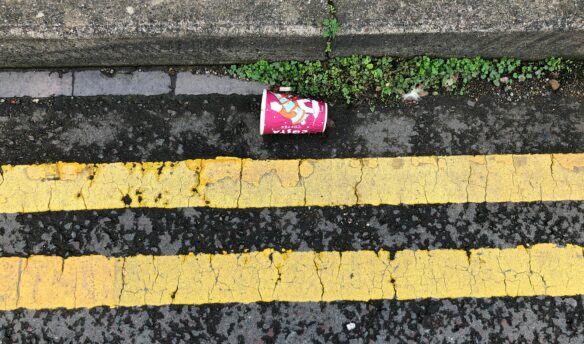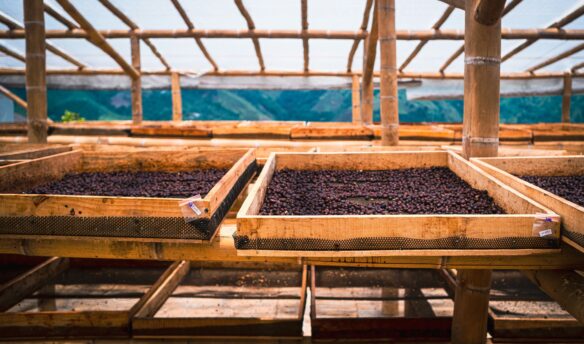It’s a battle of the brands! Luckin Coffee overtakes Starbucks in China. Plus, a new slate of world champions and coffee is basically a miracle substance.
‘Here Are The Three Newest World Coffee Champions’ – via Sprudge
Much like the final film in a long-running movie franchise, the slate of coffee competitions that comprise the 2023 World Coffee Championships was split into two.
In June, World of Coffee in Athens featured the finals of the World Barista Championship, World Brewers Cup, World Cup Tasters Championship, and the World Cezve/Ibrik Championship. Last week, Taipei hosted this year’s final three coffee competitions at the Taiwan International Coffee Show, where more than 60 national coffee champions fought it out to become the best of the best.
After a weekend of competition, the results are in:
- Rastislav “Rasty” Kasar of the United Kingdom won World Coffee in Good Spirits
- LiangFan of China took home the World Latte Art Championship trophy
- The World Roasting Champion is Taufan Mokoginta of Indonesia
Congratulations to all three!
‘Luckin Overtakes Starbucks as Top Coffee Chain in China’ – via Nation’s Restaurant News
The battle for China’s coffee affection is heating up as the formerly crisis-hit Luckin Coffee finally overtakes Starbucks as China’s most profitable coffee chain.
After a scandal-ridden couple of years when some of the company’s top executives were accused of committing massive accounting fraud, leading to its delisting on the Nasdaq exchange and eventual bankruptcy, Luckin re-emerged in 2022 to challenge Starbucks’ China supremacy.
China is one of Starbucks’ most important international markets, with then-Starbucks CEO Howard Schultz predicting that China would overtake the United States to become the company’s most profitable market by 2025. Starbucks aims to have 9,000 stores in the country by then, which is a lot, but it doesn’t even come close to Luckin’s near 11,000 locations.
Luckin has always had an advantage on store growth due to its business model: most of Luckin’s stores are small and geared towards mobile orders, making them relatively cheap to open. The company has combined this high-growth approach with low prices and innovative drinks—raw cheese or liquor-laced latte, anyone?—and this quarter, for the first time, brought in more money than Starbucks: $855 million in revenue compared to Starbucks’ $822 million.
“Starbucks used to be quite popular among young Chinese consumers,” Kiki Pang, a Guangdong-based marketing executive, told the Wall Street Journal. “Now that young people in China have more beverage options, the dynamics have changed.”
Another home-grown rival is also expanding rapidly—Cotti Coffee plans to operate 10,000 stores in China by 2025. Cotti has a similar cheap-and-fast business model to Luckin, which is unsurprising given it was founded by two former Luckin executives.
‘Coffee Grounds May Hold Key to Preventing Neurodegenerative Diseases’ – via EurekAlert
Scientists have found yet another reason you should hang on to your used coffee grounds.
According to a new study from the University of Texas at El Paso and published in Environmental Research, nanoparticles called caffeic-acid-based Carbon Quantum Dots (or CACQDs for short) derived from spent coffee grounds could help protect brain cells from damage caused by neurodegenerative diseases such as Alzheimer’s or Parkinson’s.
“Caffeic-acid based Carbon Quantum Dots have the potential to be transformative in the treatment of neurodegenerative disorders,” lead author Jyotish Kumar said. “This is because none of the current treatments resolve the diseases; they only help manage the symptoms. Our aim is to find a cure by addressing the atomic and molecular underpinnings that drive these conditions.”
Neurodegenerative diseases are characterized by the loss of neurons or brain cells. Although genetics plays a factor, when these diseases are caused by non-genetic factors, such as age or exposure to environmental chemicals, they can cause elevated levels of free radicals—molecules that attack cell membranes and cause inflammation and tissue damage. Researchers investigated whether CACQDs could protect brain cells from free radical damage.
Carbon quantum dots, which are teeny tiny carbon crystals, are sought after for their stability and conductivity (fun fact: the concept of quantum dots won the 2023 Nobel Prize in Chemistry). Right now, they’re being used in bioimaging, medical diagnosis, and the development of solar cells. Caffeic acid is a unique antioxidant that can penetrate the blood-brain barrier and affect cells within the brain and is known for its “free radical-scavenging” abilities. The researchers extracted the CACQDs by “cooking” coffee grounds at 200 degrees for four hours to “reorient the caffeic acid’s carbon structure and form CACQDs.”
According to a news release from the university, “Kumar and his colleagues found that CACQDs were neuroprotective across test tube experiments, cell lines and other models of Parkinson’s disease when the disorder was caused by a pesticide called paraquat.” The team concluded that, in the earliest stages of such a condition, “a treatment based on CACQDs can be effective in preventing full-on disease.”
More News
‘Volatile High-End Coffee Bean Market Can’t Make Up Its Mind’ – via Bloomberg
‘Kona Coffee Farmers and Kroger Accuse Each Other of Breaching $13.5 Million Settlement’ – via Daily Coffee News
‘Turn Capital Acquires Flash Coffee’s Business in Thailand’ – via World Coffee Portal
‘Dr. Bronner’s Just Launched A Coffee And Oat Milk Chocolate Bar’ – via Sprudge
‘‘Generational Change’ at JAB as Joachim Creus Appointed CEO’ – via World Coffee Portal
‘Three Questions with Aimerance Merveille of Semilla Coffee’ – via Daily Coffee News
‘From Skincare to Shampoo: World’s First Coffee Biorefinery Creates New Uses for Upcycled Coffee Grounds’ – via Beverage Daily
‘SCA Releases Green Coffee Summit Schedule’ – via Global Coffee Report
‘With Löfbergs Backing, Danish Startup Growgrounds Seeks Environmental Change in Coffee’ – via Daily Coffee News
The Week in Coffee Unionizing
- The Strategic Organizing Center (SOC), a labor federation that includes the Service Employees International Union and Workers United, has nominated three candidates for election to Starbucks’ board. According to the SOC, these new faces will add “fresh perspectives and the right expertise” to a board whose “current approach likely jeopardizes its ability to fulfill its fiduciary duties to investors and has resulted in arguably one of the most glaring and destructive examples of human capital mismanagement corporate America has seen.” Starbucks said that its nominating committee will review the candidates “in accordance with its normal process.”
- Unionized workers at Louisville, Kentucky-based Sunergos Coffee have gone on strike in response to what they say is the company’s failure to meet key demands around pay and termination clauses as part of contract negotiations. “Louisville isn’t going to grow and thrive if the people who make this city’s booming service economy work keep getting left behind,” Rebekah Jarboe told the Courier Journal. “We’re sick and tired of harassment and intimidation because we’re standing up for each other.” The union has filed several unfair labor practices charges with the National Labor Relations Board since voting to unionize in January 2023. Despite ownership saying they hoped to avoid an adversarial relationship with the union, negotiations have dragged on.
Is Coffee Good For You?
Despite waning coverage, COVID-19 has not gone away. US hospital admissions reached 16,000 the week ending November 11, 2023, and the Centers for Disease Control warns that “COVID-19 activity remains elevated.” However, along with masks, air filtration, and vaccines, there could be another way to protect yourself: coffee.
Researchers from Taiwan found that coffee can reduce the infection risk of SARS-CoV-2, the virus that causes COVID-19, regardless of the type of coffee, additions like sugar or milk, or variants like Delta and Omicron.
The study, published in Cell & Bioscience, used in vitro lab testing of human cells to test their hypothesis, as well as conducting a small human trial of 64 participants who were given a “pseudovirus,” a benign version of a virus that can be used to study it safely. In both cases, coffee inhibited the virus. “Interestingly, no matter what kind of coffee or adding additional intergrading (sugar or milk), it has the capability to reduce SARS-CoV-2 entering into host cells,” the authors wrote.
Previous research has also looked at coffee’s possible protective properties against COVID-19: one German study found that chlorogenic acid in coffee inhibited the virus from binding to human cells in a lab setting; a 2021 study from Northwestern University found that “an immunoprotective effect of coffee against COVID-19 is plausible and merits further investigation.”
Beyond the Headlines
‘What Will Ferrell’s “Elf” Can Teach Us About Coffee’ by Jackson O’Brien
‘Connecting the Dots: Inside the 2023 Coffee Barometer’ by Fionn Pooler
‘Culture, Identity, And The Promise Of Single Origin Cafes’ by Marco Dregni
















